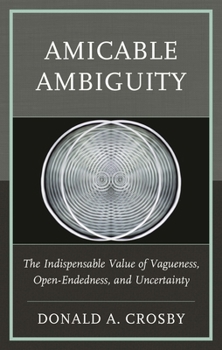Amicable Ambiguity: The Indispensable Value of Vagueness, Open-Endedness, and Uncertainty
Ambiguity has an important and often essential role to play in all areas of meaningful thought, expression, and claims to truth. Amicable Ambiguity explores areas of thought and experience where conceptual and discursive ambiguity can be the amicable friend of intelligibility and convincingness rather than their sworn enemy.
Format:Hardcover
Language:English
ISBN:1666969656
ISBN13:9781666969658
Release Date:December 2024
Publisher:Lexington Books
Length:164 Pages
Weight:0.89 lbs.
Dimensions:0.6" x 6.0" x 9.0"
Customer Reviews
0 rating





